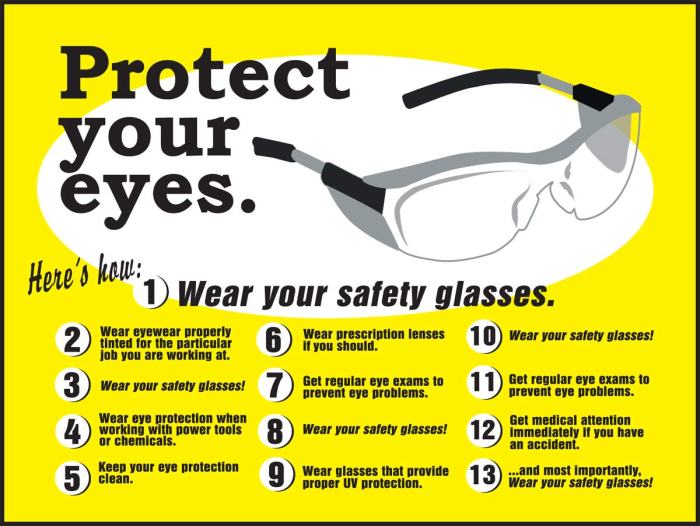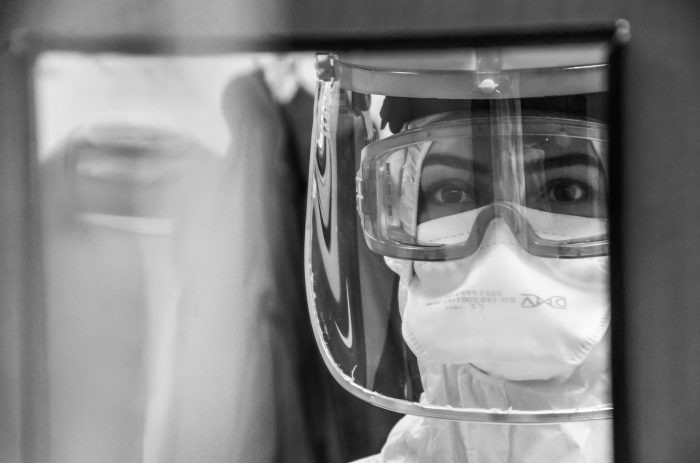Prescription glasses do not provide adequate eye protection because they – Prescription glasses, while corrective, do not provide adequate eye protection because they offer limited impact protection, insufficient UV protection, and may not effectively address glare, light sensitivity, fogging, distortion, or damage. Understanding these limitations and exploring alternative eye protection options is crucial for preserving ocular health and safety.
The content of the second paragraph that provides descriptive and clear information about the topic
Prescription Glasses: Limited Eye Protection

While prescription glasses are essential for correcting vision, they do not provide adequate eye protection in certain situations. This article will explore the limitations of prescription glasses and discuss alternative eye protection options.
Limited Protection from Impacts:
Prescription glasses are designed to improve vision, not to protect the eyes from physical impacts. They are made of glass or plastic, which can shatter or break upon impact, potentially causing eye injuries.
- Sports activities, such as basketball or hockey, where projectiles or collisions can occur.
- Construction sites or workshops, where flying debris or sharp objects are present.
Eye injuries from impacts can range from minor abrasions to severe lacerations and even vision loss.
UV Ray Exposure:
Ultraviolet (UV) rays from the sun can damage the eyes, leading to conditions such as cataracts and macular degeneration. Prescription glasses typically do not provide sufficient UV protection.
- Sunglasses with UV protection are necessary for outdoor activities, even on cloudy days.
- UV exposure can cause sunburn on the eyes, leading to discomfort and potential vision problems.
Glare and Light Sensitivity:
Glare and light sensitivity can cause discomfort and visual disturbances. Prescription glasses may not effectively address these issues.
- Anti-glare coatings can help reduce glare, but they may not be effective in all situations.
- Tinted lenses can help reduce light sensitivity, but they can also affect color perception.
Fogging and Condensation:
Fogging and condensation on prescription glasses can impair vision, especially in humid or cold environments.
- Anti-fog coatings can help prevent fogging, but they may not be completely effective.
- Fogging can be a safety hazard in situations where clear vision is critical, such as driving or operating machinery.
Distortion and Optical Aberrations:
Prescription glasses can introduce distortion and optical aberrations, which can affect visual performance.
- Astigmatism and other refractive errors can cause distorted vision with prescription glasses.
- Distortions can be particularly problematic in activities that require precise vision, such as shooting or archery.
Scratching and Damage:
Prescription glasses are susceptible to scratches and damage, which can affect the quality of vision.
- Scratches can scatter light, causing glare and reduced visual acuity.
- Broken or damaged glasses can pose a safety hazard, as they may fall off or shatter.
Alternative Eye Protection Options:, Prescription glasses do not provide adequate eye protection because they
There are various alternative eye protection options available, depending on the specific needs and activities.
- Safety glasses: Designed for protection against impacts and flying debris, typically used in industrial settings.
- Sunglasses: Provide UV protection and reduce glare, suitable for outdoor activities.
- Goggles: Offer full eye protection from impacts, chemicals, and dust, used in sports and industrial environments.
Choosing the most appropriate eye protection depends on factors such as the level of protection required, the activity being performed, and the wearer’s specific needs.
FAQ Explained: Prescription Glasses Do Not Provide Adequate Eye Protection Because They
Do prescription glasses offer complete protection from impacts?
No, prescription glasses provide limited protection from impacts and may shatter upon significant force, potentially causing eye injuries.
Can prescription glasses block all UV rays?
Not necessarily, prescription lenses may not provide sufficient UV protection, leaving the eyes vulnerable to harmful radiation.
Are prescription glasses effective against glare and light sensitivity?
Prescription glasses may not fully address glare and light sensitivity, especially in certain lighting conditions or for individuals with specific eye conditions.

